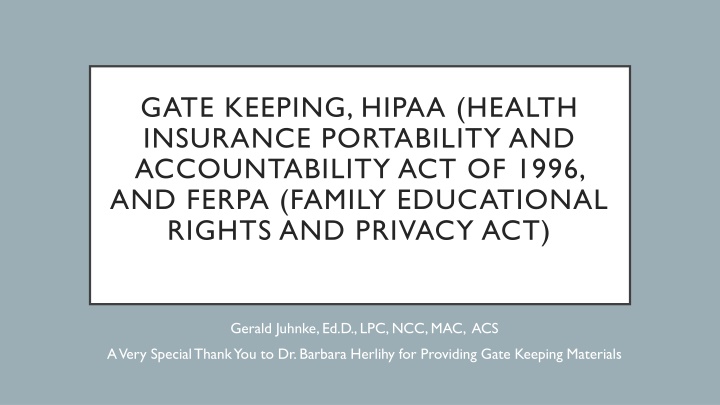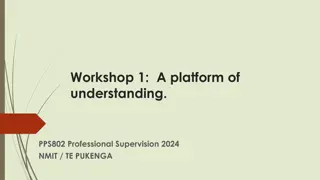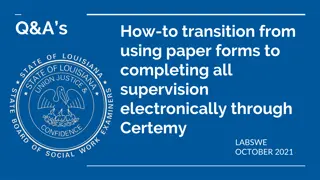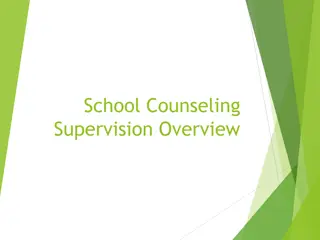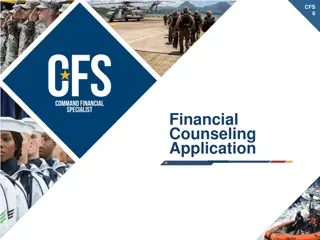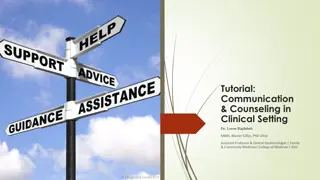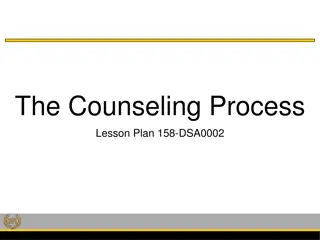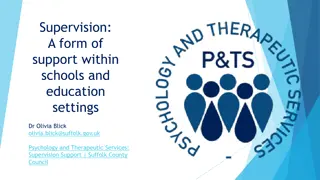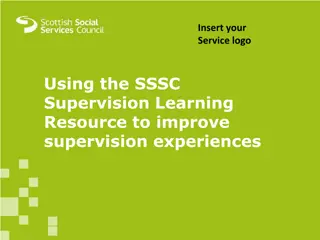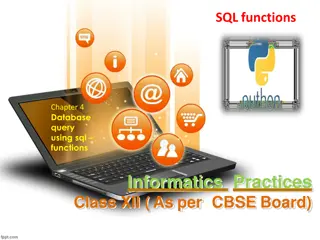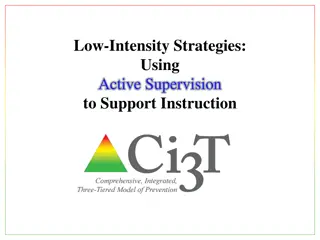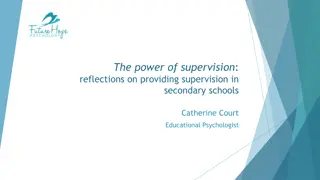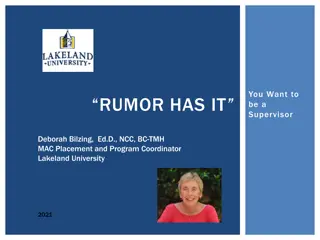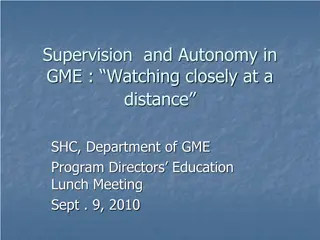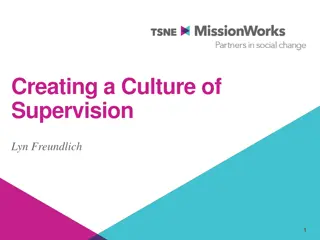Gatekeeping in Counseling Supervision: Essential Functions and Strategies
Explore the vital role of gatekeeping in counseling supervision, including reasons for its importance, consequences of interventions, and effective strategies. Learn how gatekeeping protects clients, maintains professional integrity, and evaluates supervisees for licensure progression. Delve into the historical context of gatekeeping in educational and professional settings, encompassing legal implications and ethical considerations.
Download Presentation

Please find below an Image/Link to download the presentation.
The content on the website is provided AS IS for your information and personal use only. It may not be sold, licensed, or shared on other websites without obtaining consent from the author.If you encounter any issues during the download, it is possible that the publisher has removed the file from their server.
You are allowed to download the files provided on this website for personal or commercial use, subject to the condition that they are used lawfully. All files are the property of their respective owners.
The content on the website is provided AS IS for your information and personal use only. It may not be sold, licensed, or shared on other websites without obtaining consent from the author.
E N D
Presentation Transcript
GATE KEEPING, HIPAA (HEALTH INSURANCE PORTABILITY AND ACCOUNTABILITY ACT OF 1996, AND FERPA (FAMILY EDUCATIONAL RIGHTS AND PRIVACY ACT) Gerald Juhnke, Ed.D., LPC, NCC, MAC, ACS A Very Special Thank You to Dr. Barbara Herlihy for Providing Gate Keeping Materials
IMPORTANT Given Gate Keeping, HIPPA, FERPA, and State regulations are in a continual state of evolution and change, the basic information contained within this course should be considered rudimentary and evolving. Regulations are constantly being re-interpreted and re-written . Therefore, consider these materials to be a starting point for consideration and discussion. ALWAYS access the current Gate Keeping, HIPPA, FERPA, and State rules and regulations for the most current updates and information. Annually, participate in Gate Keeping, HIPPA and FERPA updated trainings.
GATE KEEPING Gatekeeping is a vitally important function of supervisors. Gatekeeping often is one of the most uncomfortable functions a supervisor must perform.
TODAYS OBJECTIVES 1. explore the reasons why gatekeeping is essential to ethical supervision 2. examine consequences (both positive and negative) of gatekeeping interventions 3. discuss effective gatekeeping strategies
PURPOSE OF GATEKEEPING Protect clients and the profession from incompetent professional counselors, which is critical to the integrity of our profession.
GATEKEEPING: Evaluating supervisees to determine whether they should be allowed to progress through their training programs and post-graduate supervision to licensure. [Remley & Herlihy, 2016]
REMEDIATION A documented, procedural process that addresses perceived inabilities in trainees performance with the intent to provide trainees with specific means to remedy their deficiencies. [Dufrene & Henderson, 2009]
HISTORY OF GATEKEEPING Supreme Court: Horowitz v. Board of Curators of University of Missouri (1978) established right to dismiss students based on deficits in clinical performance. Lawsuits: Augusta State and EMU ACA Code of Ethics, 2014, Standard F.6.b. CACREP, 2016 Standards
WHAT IS THE DIFFERENCE BETWEEN INCOMPETENCE AND IMPAIRMENT Differences between incompetence and impairment are often blurry. Dictionary definitions: Incompetence: the quality or condition of being incompetent; lack of ability. the condition of lacking power to act with effectiveness.
WHAT IS THE DIFFERENCE BETWEEN INCOMPETENCE AND IMPAIRMENT Differences between incompetence and impairment are often blurry. Dictionary definitions: Impairment the state of being diminished, weakened, or damaged, especially mentally or physically: cognitive impairment in older adults.
WHAT IS THE DIFFERENCE BETWEEN INCOMPETENCE AND IMPAIRMENT Differences between incompetence and impairment are often blurry. Dictionary definitions: Thus, IMPAIRMENT means diminished or weakened or lacking the knowledge or skills to perform at the required level. In other words, with supervision and training there is an increased probability of being able to function at the required level. -Conversely, INCOMPETENCE indicates the inability to perform at a required level even if one participates in further training, supervision, and education.
PROBLEMS WITH GATEKEEPING. 1. Subjective no standardized procedures or benchmarks measuring interpersonal skills and intrapersonal health are much harder to assess than academic performance no professional standards exist for gatekeeping
PROBLEMS WITH GATEKEEPING. 3. What to can we assess? -Dispositions? -Ethical behavior? -Professionalism? -Skills/interventions? -Receptivity to feedback? . 4. Gatekeeping is emotionally challenging - Blinded by empathy (Glance et al., 2012) -As counselors we constantly fight for the underdog! -We believe all people can change with love, compassion, and supervision
GATEKEEPING 3. Potential for backlash Angry supervisee Lawsuit for discrimination or defamation of character 4. Vicarious liability Here the clinical supervisor may be liable through association of the supervisee through the supervision relationship. Supervisee fails to assess client for suicidal ideation and intervention Supervisee fails to follow supervisor s directive
VICARIOUS LIABILITY: NOT AS SCARY AS IT SEEMS Very few counselors or counselors-in-training are sued for malpractice. Malpractice lawsuits against counselors and CITs (and their supervisors) are difficult to win. Evidence of the low risk: Average annual cost of malpractice insurance for counselor supervisors: $327 plus supervision endorsement Average annual cost of malpractice insurance for surgeons who supervise surgery interns: $486,000 (Insurance companies base their rates on exposure to risk)
STRATEGIES FOR SUCCESSFUL GATEKEEPING: 1. develop a strong supervisory alliance (Truly, it s all about the relationship!) 2. make expectations clear 3. conduct informal, formative evaluations frequently (no surprises!)
GATEKEEPING 4. maintain appropriate boundaries (easy to relax boundaries as a supervisee gets closer to being your peer) 5. respect confidentiality rights of supervisee 6. when needed, develop a clear, behavioral remediation plan (no euphemisms) -no vague directions -indicate EXACTLY what you expect, what it will look like, and how you want it conducted -Give directions notes that include carbon copies to review at the next supervision 7. when supervisee is not progressing as needed, get ongoing consultation or supervision for your supervision of this supervisee
GATEKEEPING 8. make sure your professional liability insurance covers supervision 9. document carefully and thoroughly, contemporaneously (giving notes to the supervisee and maintaining a copy for you at the same time) 10. Keep in mind that gatekeeping creates gateways, which are designed to provide opportunities for supervisees to grow
GATEKEEPING 11. remediation plans do work! 12. take care of yourself!
HIPAA Health Insurance Portability and Accountability Act of 1996
HIPAA Purpose Federal law to create national standards to protect sensitive patient health information from being disclosed without the patient s consent or knowledge.
HIPAA FOUR CRITICAL ASPECTS Privacy of Healthcare Data Only authorized individuals are permitted to access patient data
HIPAA FOUR CRITICAL ASPECTS Security of Healthcare Data Administrative policies and procedures Physical security measures Locked offices and cabinets Locked desk drawers Computer stations and computers in locked areas when not in use Technical controls Encryption Firewalls Antivirus software
HIPAA FOUR CRITICAL ASPECTS Notifications of Healthcare Data Breaches Must notify clients within 60-days of breach Intent: to protect victims from Fraud or identify theft Must notify regulators of security breach
HIPAA FOUR CRITICAL ASPECTS Client Rights Over Their Healthcare Data Clients have a right to obtain a copy of their records for minimal or no charge Copies must be provided within 30-days. View organizations accounting disclosure log to see what changes or payments have been filed in their treatment
PSYCHOTHERAPY NOTES AND HIPAA IMPORTANT!! Notes recorded in any medium by a mental health professional documenting or analyzing the contents of conversation during a private counseling session or a group, joint, or family counseling session that are separate from the rest of the individual s medical record.
PSYCHOTHERAPY NOTES AND HIPAA Psychotherapy notes exclude: medication prescription and monitoring, counseling session start and stop times, the modalities and frequencies of treatment furnished, results of clinical tests, financial data, and any summary of the following items: diagnosis, functional status, the treatment plan, symptoms, prognosis, and progress to date.
HIPPA SUBSTANCE USE DISORDER Original regulations were drafted over 30 years ago; substantial revisions were made effective in March 2017 New terminology (e.g., Substance Use Disorder Patient Records) and attempted relevance in present era of electronic records Consent (authorization) forms are now somewhat different; they must include an explicit description of the substance use disorder information to be released Electronic signatures are now permitted Under HIPAA, records from substance use disorder programs that receive federal funds have specific requirements
WHAT TO DO IF YOUR COMPUTER IS STOLEN OR HACKED? HITECH identifies four factors to consider in analyzing and deciding whether to notify individuals 1. nature and extent of Private Healthcare Information (PHI), including types of identifiers and likelihood of re-identification; 2. who the unauthorized person was who used or received the PHI; 3. whether PHI was actually acquired or viewed; and 4. extent to which risk has been mitigated.
EXAMPLES OF BREACHES POTENTIALLY REQUIRING NOTICE Laptop, phone or other device with PHI is lost/stolen Paper medical records dumped ~ Counselor who lost phone in Taxi ~ Secretary accidentally sends email to all patients with reply all activated Do you use laptop, cell, etc. with your supervisees?
IF YOU MUST REPORT https://ocrportal.hhs.gov/ocr/breach/breach_report.jsf
CONTINUALLY AND REGULARLY Review HIPAA and HITECH regulations to ensure your practice and agency is maintaining confidentiality and security of client personal healthcare information (Quarterly?, Semiannually?, Monthly?) Remember, software vendors and IT service members likely qualify as business associates and must comply with HIPAA regulations. Implement security measures sufficient to reduce risks and vulnerabilities to patients/clients. Create a Sanction policy apply and document sanctions to workforce members who fail to comply with security policies.
FURTHER Ensure all employees, supervisees, supervisors, mental health professionals have appropriate access to electronic Personal Healthcare Information and prevent those who do not from having electronic access. Create written policies and procedures for authorizing access to electronic Personal Healthcare Information Key cards Keys Passwords
CREATE CONTINGENCY PLANS Data backup Disaster recovery plan Implement procedures for periodic testing and revisions of the contingency plans
REMOVAL OF HARDWARE PROCEDURES AND POLICIES What are your agency s procedures and policies related to disposal of computers and electric hardware that might contain Personal Healthcare Information What are your procedures related to storage of Personal Healthcare Information hard drives, flash drives, and flash drive use? Maintain a record with history of same Hire an external HIPAA Expert Consultant to review all policies and procedures and create a HIPAA compliant practice or agency.
FERPA Family Educational Rights and Privacy Act Designed to protect the privacy of students and student records. FERPA applies to schools accepting funds from the U.S. Department of Education
FERPA FOUNDATIONAL POINTS Data must be protected. Parents and students have rights. Sharing means, whomever is asking MUST have a need for it and have legitimate educational interest The request must be WRITTEN Get permission beforehand Share with Care only. Information is directly related to a specific student. The shared information will not be harmful or invasive if disclosed Opt out if possible
DIFFERENCES BETWEEN HIPAA AND FERPA HIPAA is designed to keep medical records secure. FERPA is designed to keep education records private.
HOW WE SHARE INFORMATION FERPA was enacted in 1974 Federal law Determines HOW we share student information. Designed to Protect Students and Families Allow parents to view educational records Dictates which information can be shared
WHAT RIGHTS DO PARENTS HAVE? The right to review their child s educational records. The right to challenge and seek to amend their child s education records. The right to require consent prior to the disclosure of personally identifiable information in educational records
COUNSELORS Although counselors do not typically maintain student records, counselors need to understand FERPA in regard to: Confidentiality Case Notes Dissemination of Student Information
EDUCATIONAL RECORDS Are ANY records the school has specific to a student. Most often these records include: Grade transcripts Teacher reports Work Samples Notes Case notes from counselor Case notes from others (i.e., School Psychologist, Nurse, etc.)
CASE NOTES Case notes are of particular concern for counselors Case notes that are maintained in a school Student Information System track attendance, grades, social and emotional well-being, etc. can be accessed by parents at any time Case notes kept in the sole possession of the counselor, not accessible by anyone else, that are used as a personal memory aid are NOT typically considered educational records.
WHEN IS CONSENT NOT REQUIRED Directory Information Name Grade Age, Photo Sports, band, choir participation Releasing information to those with legitimate educational interests typically does not require consent Other teachers within the school seeking to provide additional learning opportunities, etc. Colleges interested in student Military
WHO ARE LEGITIMATE EDUCATIONAL INTERESTS Colleges Military Teachers and counselors talking PRIVATELY in office with door shut (no hallway chatter).
STUDENT IS MAKING THREATS ON FACEBOOK FERPA permits the sharing of information during health and safety emergencies to keep students, staff, and community safe.
BEFORE SHARING ASK YOURSELF Who am I sharing with? What documentation do they have to support they are who they say they are and photocopy that information and consult with principal. What am I sharing? Why does this person need/want this information? Where am I going to share this information (never in hallway, never in public) How am I sharing this information
